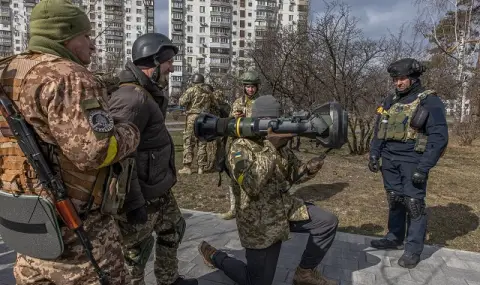Russian forces have stepped up their long-running offensive west and southwest of Donetsk city. Apparently, the coordinated operations from Pokrovsk to the western flank of the Ukrainian defenses around Vagledar are intended to increase the pressure on the Ukrainian forces defending in the western part of Donetsk Oblast and in the direction of Pokrovsk. Russian forces have achieved minor tactical successes in the area since September 1.
Russian President Vladimir Putin acknowledged intensified Russian operations in the area during a speech at the Eastern Economic Forum in Vladivostok, Primorsky Krai on September 5, claiming that Russia's Eastern Group of Forces (responsible for the front roughly from Vaghledar to Hulyapole) had taken "triangle" from territory to seven kilometers on September 3.
This is what the Institute for the Study of War (ISW) writes in its next analysis of hostilities.
Russian forces have already managed to partially expand the southern sector in Pokrovsk and want to cover tactically limited Ukrainian positions in the countryside east of Girnik and north of Krasnogorovka. Russian forces are reported to have advanced to the outskirts of Ukrainsk and are closing in on the outskirts of Girnik, and the capture of these towns would allow Russian forces to attack Kurakhovo - an important Ukrainian defense hub for the front west and southwest of Donetsk city - from the north as well as from the east from Krasnogorovka and Maksimilianovka.
Russian forces conducted an unsuccessful offensive effort in the western Donetsk region in the winter of 2022-2023, characterized by mass attacks on Vagledar itself, but now appear to be pursuing gradual progress along multiple lines of attack.
Putin continues to play down the Ukrainian incursion into the Kursk region and convince the Russian people that the Kremlin's delayed and disorganized response to the Kursk incursion is an acceptable price for further Russian advances in the Donetsk region. Putin said during his speech at the Eastern Economic Forum on September 5 that the Ukrainian incursion into Kursk Oblast had failed to stop Russia's offensive operations in "key directions" of Eastern Ukraine.
Putin claims that there has been a sharp increase in the number of people interested in signing military service contracts with the Russian Ministry of Defense (MoD). It also claimed that Ukrainian forces were suffering "severe" losses in manpower and equipment, but did not provide specific figures for these losses. However, his claims that the Kursk invasion had no operational impact are patently false, as ISW reported.
Ukraine's commander-in-chief, General Oleksandr Sirsky, said in an interview with CNN published on September 5 that the Ukrainian incursion had foiled a planned Russian attack in the Sumy region and had "reduced the threat" by the Russians in Northern Ukraine.
Syrsky said Ukraine's main goals for the invasion were to prevent Russian forces from using the Kursk region as a safe haven to prepare for offensive operations in Ukraine, to divert Russian forces from other unspecified areas in Ukraine, to create a "zone for security", to take Russian prisoners of war and boost Ukrainian morale. Sirsky said Russian forces have moved tens of thousands of troops into the Kursk region.
Syrsky recently said that Russia has moved approximately 30,000 troops from Ukraine to Kursk Oblast to respond to the Ukrainian invasion.
A significant additional redeployment of Russian troops from the front line in Ukraine would very likely be necessary to allow Russia to regain control of its territory in Kursk, as US intelligence officials have reportedly estimated, and would significantly affect the Russian offensive operations and Russia's ability to prepare for future operations.
Russia continued its efforts to strengthen economic relations with non-Western countries on the sidelines of the Eastern Economic Forum (EEF) in Vladivostok, Primorsky Krai. Russian President Vladimir Putin shared the stage during his speech with officials from Malaysia and the People's Republic of China (PRC) on September 5 to discuss bilateral cooperation and multilateral projects.
Malaysian Prime Minister Anwar Ibrahim told Putin during a plenary session that Malaysia was interested in joining BRICS and said Russian-Malaysian cooperation on what Ibrahim called "Islamic finance" would help Russia attract more investment than most Muslim countries.
India's ambassador to Russia Vinay Kumar said India expects to increase imports of Russian oil by 2030 and that India and Russia are developing a new interbank exchange system.
He also expressed hope that Russia would increase its fertilizer exports to India. The executive director of the Russian State Corporation for Atomic Energy "Rosatom" Alexey Likhachev emphasized the ongoing work of "Rosatom" with India and Vietnam for the development of the Northern Sea Route through the Arctic, a shipping route between Western Eurasia and the Asia-Pacific region.
Putin also discussed the joint efforts of the PRC and Russia to address and mitigate external challenges to bilateral cooperation between the two countries with Vice President of the PRC Han Zheng. This conversation came amid a statement by the chief executive of Russian metals and renewables company En+, Vladimir Kolmogorov, to EEF, who claimed that a major joint Russian-Chinese coal project in Siberia was facing financial difficulties due to concerns among PRC companies on Western secondary sanctions.
ISW has previously noted that Russian efforts in the EEF are largely centered around diplomatic efforts with non-Western countries to avoid Western sanctions.
Ukrainian officials announced a series of government appointments on September 5. Deputy Yaroslav Zheleznyak announced that the Verkhovna Rada voted to appoint the first deputy minister of foreign affairs Andrii Sibikha as foreign minister; The head of the Ukrainian state defense enterprise "Ukroboronprom", Herman Smetanin, as Minister of Strategic Industries; former Deputy Prime Minister for European Integration Olga Stefanishina as Minister of Justice;
Deputy Head of the Presidential Cabinet Alexii Kuleba as Minister of Development of Communities, Territories and Infrastructure; and Deputy Defense Minister Natalia Kalmikova as Minister of Veterans Affairs.
